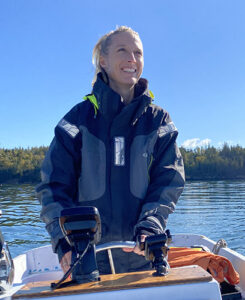Lauren Ross embarks on Fulbright to expand estuary research beyond U.S. borders
 Lauren Ross’s research on the physics of estuaries has brought her all over the world, from France to Frenchman Bay along Mount Desert Island. With her recently-awarded Fulbright, Ross will lead a team of scientists to Chile to look at these transition points between freshwater rivers and the salty sea in a place where so many livelihoods depend on the health of these complex ecosystems.
Lauren Ross’s research on the physics of estuaries has brought her all over the world, from France to Frenchman Bay along Mount Desert Island. With her recently-awarded Fulbright, Ross will lead a team of scientists to Chile to look at these transition points between freshwater rivers and the salty sea in a place where so many livelihoods depend on the health of these complex ecosystems.
The project will not only continue a budding partnership between UMaine and Chilean scientists, but the data that it gleans may even provide unique insights to Maine’s estuaries thousands of miles away.
“Land-sea connections are super important because the majority of people live on the coast,” Ross says. “The coasts of estuaries support coastal communities, shipping ports, aquaculture activities, and a delicate ecosystem, all of which are susceptible to anthropogenic effects such as coastal pollution and of course climate change. It’s super complex, and that is what’s so intriguing. Every estuary behaves so differently. Even along the same estuary the physics can change from day to day, to year to year. There is something to constantly discover.”
Ross is an associate professor of civil and environmental engineering at UMaine and a faculty fellow at the Senator George J. Mitchell Center for Sustainability Solutions.
Excerpted from a UMaine News article.
Resources:
- Research by Lauren Ross and Sean Smith on shellfish toxin movement featured on UMaine News
- Lauren Ross: Working with coastal Maine stakeholders to tackle real-world problems
- Ross earns NSF CAREER award to study fresh, saltwater mixing in estuaries
- Talk – The Land-Sea Conjunction Junction…what’s the function? Connecting coastal places, people, and science
